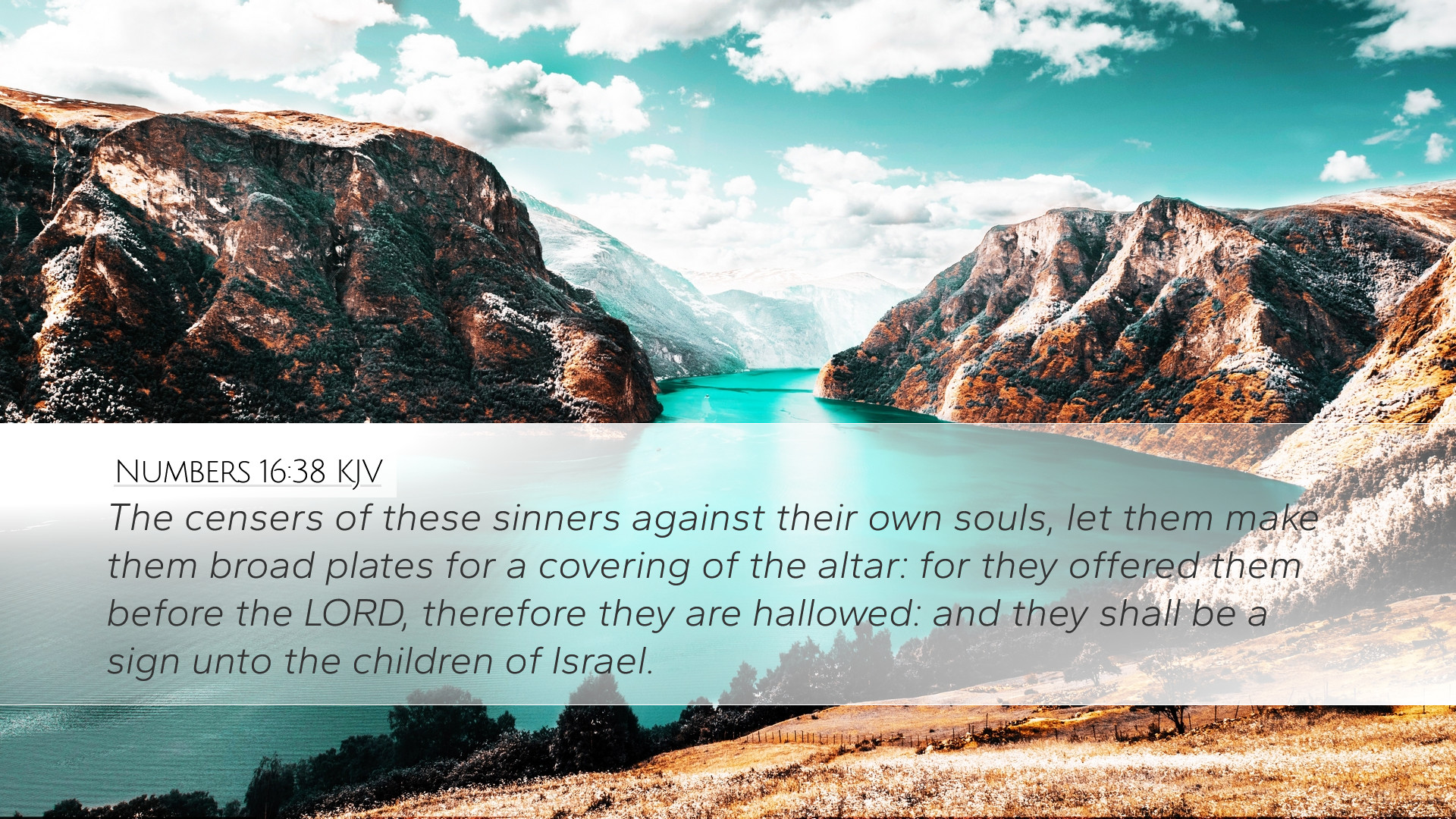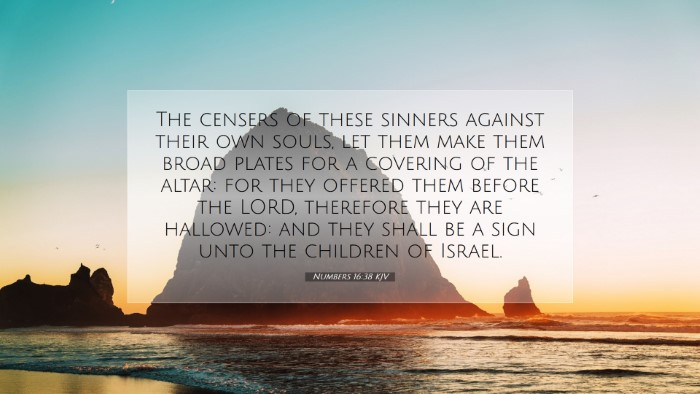Commentary on Numbers 16:38
Bible Verse: Numbers 16:38 (KJV) - "The censers of these sinners against their own souls, let them make them broad plates for a covering of the altar: for they offered them before the LORD, and they are hallowed, and they shall be a sign unto the children of Israel."
Introduction
The narrative within Numbers 16 centers around the rebellion of Korah, Dathan, and Abiram against the leadership of Moses and Aaron. This particular verse highlights the consequences of their actions and the sanctification of the censers they used in their misguided rebellion. The significance of this verse is reflected in its theological implications and the lessons it offers to contemporary readers.
The Background of the Event
According to Matthew Henry, the rebellion of Korah was not merely a personal affront to Moses but a challenge to the very order established by God Himself. Korah's intentions stemmed from a deep-seated jealousy of the priesthood, which he deemed was monopolized by Aaron and his descendants. The events lead to a tragic end where God's judgment fell upon these rebels, showcasing His sovereignty and holiness.
Albert Barnes underscores this pivotal moment in Israel's history, illustrating how it serves as a deterrent against disobedience and a testament to divine authority. The actions surrounding the censers become emblematic of how those who oppose God’s ordained authority ultimately face dire consequences.
The Censers and Their Significance
In Numbers 16:38, the censers used by the rebels are instructed to be melted and repurposed as plates for the altar. Adam Clarke provides insight into this act of transformation, emphasizing that while the censers were tools of rebellion, they are now set apart for sacred use. Clarke notes that this demonstrates God’s ability to bring forth good from evil and to redeem the instruments of sin for His glory.
- Divine Justice: The consecration of these censers highlights the concept of divine justice, as God ensures that even in punishment, there is a path to redemption.
- Reflection of Holiness: The act serves as a reminder to the Israelites of the holiness of God’s standards, effectively becoming a physical representation of what it means to be hallowed before the Lord.
Theological Implications
The use of the censers to create plates for the altar encapsulates several rich theological themes. Matthew Henry points out that this transformation signifies an acknowledgment of wrong and the repentance that is requisite for true restoration. Worship, as framed by this narrative, requires a recognition of sin and an appropriate response to God’s holiness.
Additionally, Albert Barnes emphasizes that the creation of these plates functions as a perpetual sign and reminder to the children of Israel. It signifies that rebellion against God’s appointed leadership will lead to destruction, while submission and reverence can lead to consecrated service.
Lessons for Today's Church
The lessons drawn from Numbers 16:38 extend beyond ancient Israel, resonating with contemporary believers and the church’s leadership. The principles exposed in this verse challenge modern congregations to reflect on their attitudes toward spiritual authority and the importance of honoring God’s order in His church.
- Submission to Authority: Just as the Israelites were reminded of the repercussions of rebellion, today’s believers are called to submit to spiritual authority under God’s sovereign plan.
- Holiness in Worship: The transformation of the censers reminds us that our worship must be rooted in reverence and humility, acknowledging God’s sovereignty and holiness.
- Redemptive Potential: The redemptive nature of the censers serves as a powerful reminder that God can redeem even our rebellious actions for His purposes, leading us toward a deeper understanding of grace.
Conclusion
Numbers 16:38 offers a profound insight into the nature of rebellion, judgment, and redemption. It encourages pastors, students, theologians, and scholars to delve deeper into the narrative and draw applicable lessons for their spiritual journeys and communal worship practices. The merging of judgment and grace exemplifies the ways in which God interacts with humanity, demanding both holiness and offering redemption.


